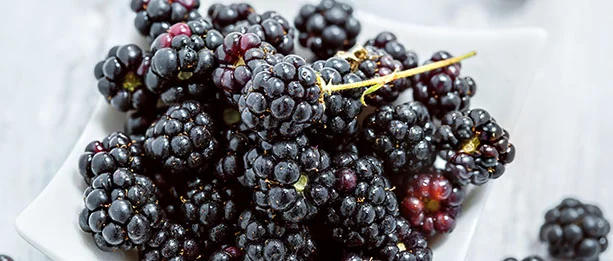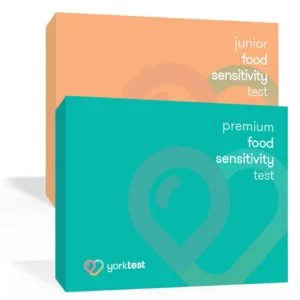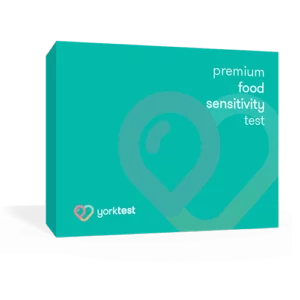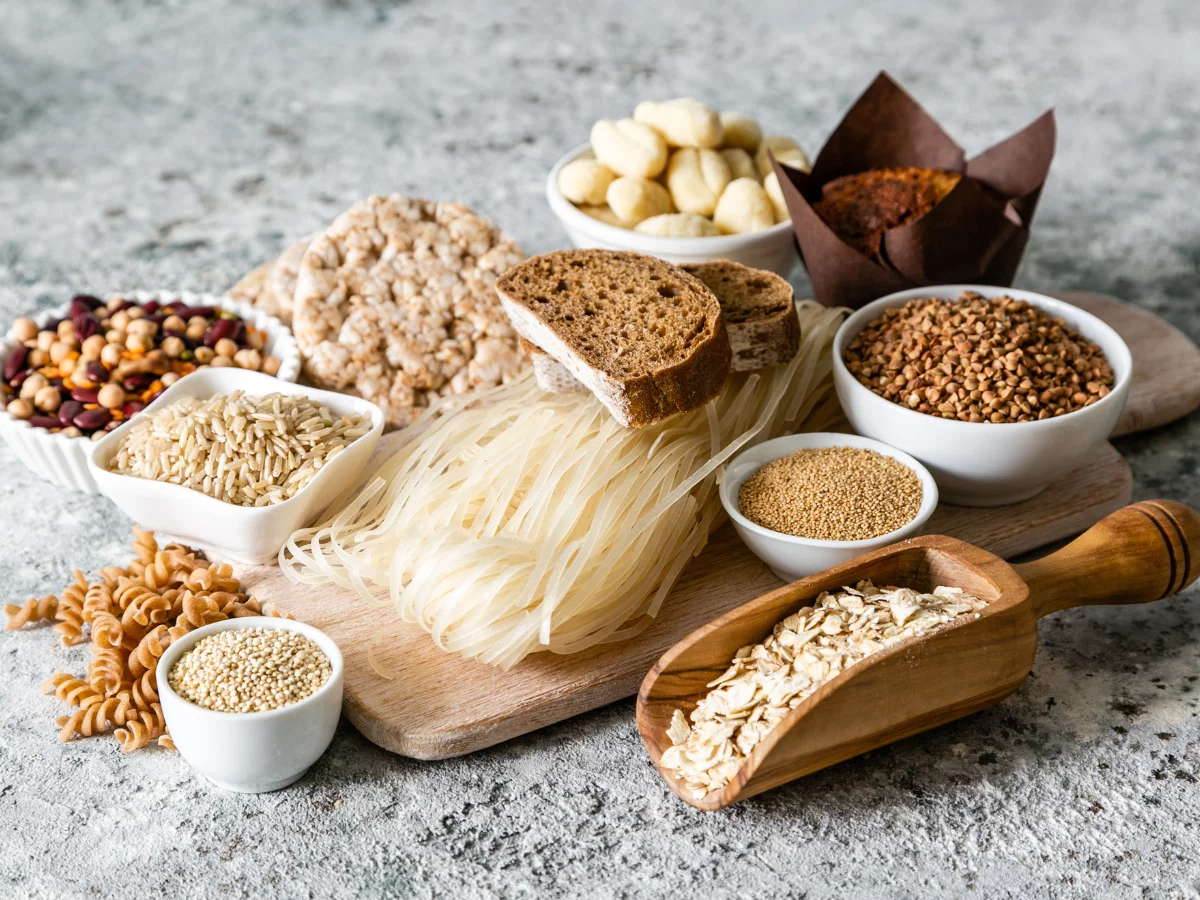- Apples
- Why Do Apples Make You Burp?
- Bread
- Why Does My Stomach Bloat After Eating Bread?
- Onions
- Do Cooked Onions Cause Gas?
- Blackberries
- Are Blackberries Hard On Your Stomach?Â
- Garlic
- Why Is Garlic Gassy?
- Milk
- Why Does Oat Milk Cause Gas and Bloating?
- Nuts
- What Are The Worst Nuts for Gas and Bloating?
- Artificial Sweeteners
- How Does Artificial Sweeteners Cause Gas?
- Tomato
- Are Tomatoes A Laxative?
- Avocado
- Does Avocado Make You Bloat?Â
- 8 out of 10 customers saw an improvement following a YorkTest informed elimination diet
- Premium Food Intolerance Test
It isn’t something that most of us like to talk about, but the reality is that nearly everyone experiences bloating or gas at some point. For most of us, this is just a normal fact of life; a natural result of foods being broken down and digested by the body. However, some of us may find that certain foods lead to an uncomfortable amount of bloating and/or gas. Whether it’s a frequent occurrence or a sporadic surprise, bloating and gas can be unsettling. Bloating could also be accompanied by a stomach upset which, in some cases, may cause real discomfort and pain.
What is even more concerning is the fact that many people don’t recognize a particular food as the cause of their bloating issues. As such, the problem food continues to be eaten, causing more discomfort while remaining completely undetected.
If you think a certain food might be causing problems for you, but you can’t quite put your finger on what, there’s no need to worry – we’ve got you covered. We’ve put together a list of foods that can cause bloating or gas, as well as those that help to relieve bloating. We’ll also address some of the most commonly asked questions about each food.
Apples
Apples are rich in fibre, which is essential in facilitating healthy digestion. However, some may find that high-fibre foods like apples give them excessive gas and bloating. This is more common in those who have low-fibre diets. Because the digestive system isn’t used to the sudden increase, the body sees a fluctuation in unnecessary gas or bloating.Â
Why Do Apples Make You Burp?
As previously alluded to, apples may make you burp because the fibre can cause a sudden increase in gas. Another reason apples may cause burping is because they contain sorbitol, a sugar alcohol that also causes gas and bloating.Â
Bread
Bread is a staple food around the world, and most people can eat it regularly with very few issues. However, it’s not plain sailing for everyone. Some may find that bread causes excessive gas and painful bloating. If you find that this happens to you after eating just a small amount, it could be the case that you have a wheat intolerance or gluten intolerance, which causes stress on the gut and digestive system.
Why Does My Stomach Bloat After Eating Bread?
While gluten or wheat intolerance is one of the most common causes of gas and bloating after consuming bread, there could be other causes. One is fructans, a type of carbohydrate found in wheat that humans struggle to digest. During digestion, bacteria in the gut ferment fructans, which can cause gas and bloating. Another reason may be eating too many carbohydrates. If you eat too many carbohydrates at once, your body will retain water, which can lead to bloating.Â
Onions
Onions contain high levels of fructose, a natural sugar present in many fruits and vegetables that make you bloated. Some people cannot properly break down and absorb the sugar. If fructose isn’t absorbed into the bloodstream as it should be, it travels down into the lower bowel, providing a feast for the bacteria that live there. As the bacteria “feed” on fructose, methane is produced, which can cause bloating, gas, and cramps, along with the bad breath that’s famously associated with onions. Not a great combination!
Do Cooked Onions Cause Gas?
It is true that cooked onions are easier to digest than raw onions and are, therefore, less likely to cause gas. However, cooked onions can still make you gassy and bloated. One of the main causes is the fact that onions contain fructans, which can be challenging to break down and subsequently cause gas and bloating.Â
Blackberries
Whilst they’re delicious and high in antioxidants, these innocent-looking little hedgerow fruits are packed full of polyols. Polyols – also known as “sugar alcohols” – are carbohydrates commonly used in the synthesis of artificial sweeteners. Whilst they’re less calorific than sugar, polyols take longer to break down and stay in the digestion system for longer. This means they’re not always fully absorbed by the body, resulting in gas and bloating.
Are Blackberries Hard On Your Stomach?Â
While blackberries can cause digestive problems (mainly related to sorbitol that gives some people trouble), generally speaking blackberries can be very good for your gut. Because blackberries are high in fiber and water, they can help with digestion and constipation.Â
Garlic
Garlic is a natural antibiotic with many health benefits, but unfortunately it can result in gas for some individuals. Cooked garlic – whether roasted or stir-fried – is much less likely to cause bloating and gas, but it may still result in some problems.
Why Is Garlic Gassy?
Garlic may cause gas for numerous reasons. This may be because of the fructans it contains, due to a garlic intolerance or sensitivity, or digestive issues like IBS.
Milk
Alongside calcium and vitamin D, milk contains many proteins, including casein and whey. The proteins can be difficult to break down if the digestive system is not working to full capacity. If a cheese sandwich followed by a latte leaves you feeling bloated and windy, then this could be why.
Why Does Oat Milk Cause Gas and Bloating?
Rather surprisingly, oat milk may cause more gas and bloating than regular milk. This is attributed to the levels of fiber and sugar in the drink. With this being said, Oat milk should not cause bloating for most people.Â
Nuts
The high fat and fiber content in nuts means that it takes a while for them to be properly digested. As they spend a lot of time working through the digestive system, the risk of gas and bloating is markedly increased. Nuts also contain tannins which can present problems like nausea for some.
What Are The Worst Nuts for Gas and Bloating?
Some of the worst nuts for gas and bloating include walnuts, hazelnuts, and almonds due to their higher fiber levels. Cashews are also problematic because they are high in fermentable carbohydrates called FODMAPs, which can lead to gas and bloating. Pistachios are more likely to ferment in the gut too, which in turn produces gas.Â
Artificial Sweeteners
Whilst technically not a food, artificial sweeteners are a common addition to many food and drink items on the market today. The body can find artificial sweeteners difficult to digest, which increases the likelihood of gas, bloating, and bowel problems. Many products containing artificial sweeteners even carry a warning that excessive consumption may lead to “laxative effects.” We’ve covered a bit more about artificial sweeteners in this article that discusses how healthy sweeteners are.
How Does Artificial Sweeteners Cause Gas?
While it may be surprising, the majority of artificial sweeteners can cause gas and bloating due to how they are processed in the digestive system. This can be due to incomplete digestion, the type of sweetener and how it interacts with your body, individual sensitivities, and the osmotic effect.Â
Tomato
The tomato fruit is high in naturally occurring acids. Because of their high acidic content, tomatoes can sometimes stimulate the production of stomach acids which can result in bloating and gas. Try doing as the Italians do – remove the skins after boiling the tomatoes in a pan of water. This will enable the body to digest the tomatoes more easily.
Are Tomatoes A Laxative?
Tomatoes are often described as a laxative fruit. Foods that are high in water content and fiber, like tomatoes, may rehydrate you and support normal bowel movements. Accompanying this is the fact that high-fiber foods add bulk to stool and help to reduce constipation. So, while tomatoes may not have you stuck on the toilet, they do have some laxative properties.Â
Avocado
Like nuts, avocados are packed full of good fats and essential fiber. They are also a high polyol food, meaning the rate of digestion and risk of gas being produced is even higher. Often it’s a case of amount: eating ¼ – ½ an avocado is fine, but a whole one may cause a problem.
Does Avocado Make You Bloat?Â
While avocados do cause bloating that can be discomforting and painful, avocados can actually help some people with bloating. Avocados can relieve bloating thanks to their potassium content, which helps balance sodium levels and manage water retention. So, while avocado bloating is a serious issue, an avocado may also help with your bloating problem. The important thing to remember is there is no “one size fits allâ€; when you do consume avocados, just remember to assess and monitor your reaction to them.Â
As always, everyone will have different reactions to the foods on this list, and all items are healthy and beneficial in moderation. Some of you might even be able to feast on a meal of blackberry, avocado, and onion sandwiches, washed down with a milkshake, and feel absolutely fine!
However, if you’re not that lucky and you think certain foods may be triggering discomfort, it could be worthwhile investigating further with our IBS Programme. Rather than simply guessing which foods cause problems, you’ll receive a list of potential triggers and have access to advice that helps you optimize your diet to work best for you. This way, you can enjoy the healthy foods you love while reducing discomfort or embarrassment.
8 out of 10 customers saw an improvement following a YorkTest informed elimination diet
Premium Food Intolerance Test
- Take the test in the comfort of your own home.
- 200 food and drink ingredients tested.
- Identify food triggers like cow’s milk, eggs, wheat, and gluten.
- Fast and clear color-coded results within 7 days.











